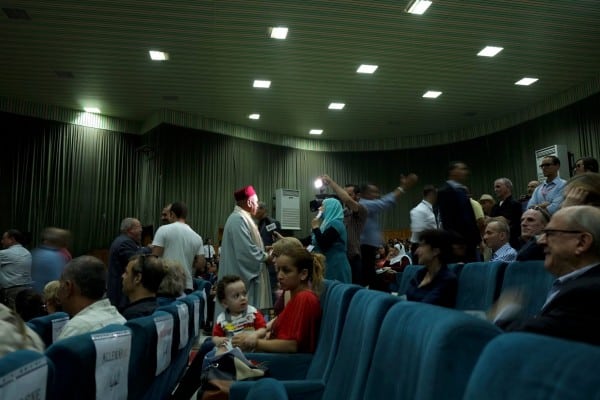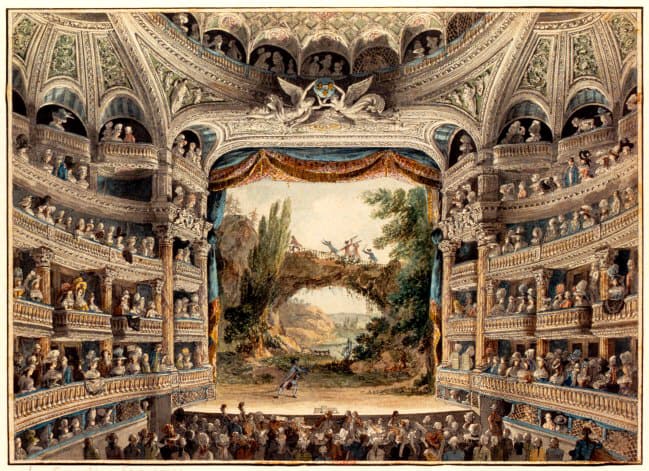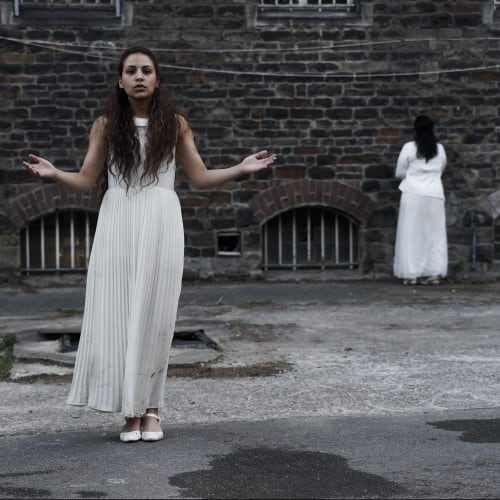Definitions of ‘performance’ abound. Some of the principal reasons for anthropologists’ continued interest in the subject of performance are the reflexive, relational, and embodied dimensions of performance. Performance is a prism for studying human life.
In his essay ‘On the anthropology of the actor’, the great German philosophical anthropologist Helmuth Plessner writes:
“One human embodies another. Nowhere else is this being shown to us. Poetry and fine arts embody ‘indirectly’ and ‘in distance’, in words, colours, and form, not through humans themselves”. (1982 [1948], Note 1)
Eric Bentley famously broke this observation down into his minimal definition of theatre drawn from The Life of Drama (1964), yet not without adding the crucial element of observation and reflexivity:
“A impersonates B while C looks on.”
His intervention was crucial at the time, destabilising the authority of the word in common drama jargon in favour of activities and practices. For him, when “we see a play in a theatre, possibly against a pictorial background, we watch people encountering each other” (ibidem, p. 64). The notion of performance with its emergent qualities of unexpected spontaneity and contingency has done a great deal to destabilise the institutional and Euro-American frameworks and legacies often still associated with European drama and theatre. However, theatre is no longer reducible to his minimal definition rooted in the suspension of disbelief or embodiment and enacting.

Performance is more than theatre, because it includes “patterns of behaviour, ways of speaking, manners of bodily comportment – whose repetitions situate actors in time and space, structuring individual and group identities”, writes Kapchan (1995: 479). Performance, in a sense first introduced systematically to anthropology by Victor Turner and Richard Schechner, opens the door to seeing all kinds of activities as performed, enacted, and to appreciating actions as performative if they have certain effects or are themselves executing more than ‘just make-believe. I value Kapchan’s inclusive definition, because, like Erving Goffman, he expands the vocabulary we use to describe what is often referred to in an impoverished fashion as just ‘performance’. Why don’t we consider the full range of the theatrical repertory when we describe social action through its metaphory? Social life is nuanced and subtle, varied and ever-changing, which requires ethnographers to expand their vocabulary from performance to its many constitutive elements.
This thematic thread offers to expand our perspective by providing a view into practices of rehearsing, probing, improvising, scores, scripts, choreographies, backstage, frontstage, emergences, entries and exits, frames and scenes. These new anthropological approaches to performance present more than a collection of accounts on one tradition of playful enactment or another.
They open up the reflexive, relational, and embodied nature of social life through the prismatic quality of performance, both as ethnographic subject and analytical tool.
Not concerned with ‘individual performances’ as is theatre studies, but with contextualised relational practices and encounters, these new anthropological approaches to performance bring to view reflexive environments where things, persons, and ideas, even larger entities like states and human rights are enacted, rehearsed, and probed, rendering them ultimately comparative.

The four essays published this week under the thematic thread ‘New anthropologies of political performance’ (#performance) examine a range of practices that exemplify some of these subjects I have in mind: not just theatre or music, but protest and popular press conferences, gender and violence, reflexive political transformations and ethical self-cultivation.
The anthropologist Vita Peacock opens this thematic thread with a provocative and evocative piece on a centuries-old British tradition invented anew by the hacktivist network Anonymous: the ‘Million Mask March’. Based on her own ethnographic research with the activists as part of her ongoing ESRC-funded post-doctoral project, she explores the theatricality of protest and the double-nature of the political manifestation.
Following Peacock’s investigations in London, anthropologist Andrea Grant takes us into a crassly different fieldsite: the entertainment press conference. Drawn from her ongoing research on popular music in Rwanda, she examines the relational, confrontational, and emergent qualities of this underexplored performative site.
In the first of two review essays, Vanessa A. Farr, who is both research fellow at the centre for African Studies of the University of the Free State in South Africa and independent consultant specialising in gender, peace and security in the Islamic world provides a captivating read of Julie Billaud’s Kabul Carnival: Gender Politics in Postwar Afghanistan (University of Pennsylvania Press, 2015). Farr’s review essay untangles the complex webs that Billaud spins between Bakhtin’s and Rabelais’ notion of the carnivalesque, embodiment and performance theory, and the unheard plights of Afghan women’s responses to social anxieties under military occupation.
Scott Head, anthropology professor at UFSC (Federal University of Santa Catarina) in Florianópolis, Brazil completes this thematic week on new anthropologies of political performance with a review of Alex Flynn’s and my recent edited collection Anthropology, Theatre, and Development: The Transformative Potential of Performance (Palgrave, 2015). His review essay offers an unusual and thought-provoking reading of what ethnography has to do with political performance, and how we might rethink one in the light of the other, treating ethnography itself in such reflexive and/or performative terms.
Notes
(1) Plessner’s original citation reads: “Ein Mensch verkörpert einen anderen. Nirgends sonst wird uns das gezeigt. Dichtung und bildende Kunst verkörpern ‚auf Umwegen‘ und ‚im Abstand‘, in Wort, Farbe und Form, nicht in Menschen selbst.”
References cited
Bentley, Eric. 1964. The Life of Drama. New York: Atheneum.
Billaud, Julie. 2015. Kabul Carnival: Gender Politics in Postwar Afghanistan. Philadelphia: University of Pennsylvania Press.
Flynn, Alex and Jonas Tinius. Eds. 2015. Anthropology, Theatre, and Development: The Transformative Potential of Performance. Basingstoke/New York: Palgrave Macmillan.
Kapchan, D. A. 1995. ‘Performance’. Journal of American Folklore. 108 (430): 479-508.
Plessner, Helmuth. 1982 [1948]. ‘Zur Anthropologie des Schauspielers’, in: Mit Anderen Augen: Aspekte einer Philosophischen Anthropologie. Berlin: Suhrkamp, pp. 146–163.
Image credit (front image)
Rehearsals of ‘Ruhrorter’ refugee theatre project in Germany by Franziska Götzen





